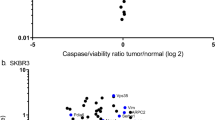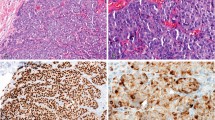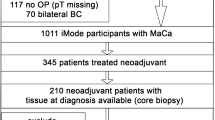Abstract
The staining pattern of a monoclonal antibody directed to the monomorphic determinant of HLA-DR antigens was examined on sections of human mammary gland tissues at various stages of differentiation as well as on 50 benign and 72 malignant breast lesions. Normal resting breast epithelium lacked HLA-DR, whereas late-pregnant and lactating epithelia expressed high levels of HLA-DR antigens, followed by a decline in the post-weaning regression period. Most benign breast lesions revealed heterogeneous staining ranging from very few up to 20-25% positive epithelial Greater variability was observed among carcinomas, where a small group (approximately 7%) of cases showing 40-95% positive tumour cells was found, in addition to negative tumours and those with the minority of HLA-DR expressing carcinoma cells. The density of the leukocytic infiltrate was higher in carcinomas than in either normal breast tissue or benign lesions, the HLA-DR phenotype of the mononuclear infiltrating cells lacking any obvious correlation with the HLA-DR status of the epithelial component. Immunoblotting analyses of whole-tissue lysates separated by SDS-PAGE confirmed the immunohistochemical data and demonstrated the reactivity with only one protein band predicted for HLA-DR alpha-chain. The combination of immunohistochemistry and autoradiography on sections of human reduction mammoplasty organoids cultured in collagen gels and labelled with tritiated thymidine revealed a lack of HLA-DR expression on proliferating breast epithelial cells suggesting factors other than cell kinetics must be responsible for induction of HLA-DR antigens seen in pregnant and lactating breast epithelium and some tumours.
This is a preview of subscription content, access via your institution
Access options
Subscribe to this journal
Receive 24 print issues and online access
$259.00 per year
only $10.79 per issue
Buy this article
- Purchase on Springer Link
- Instant access to full article PDF
Prices may be subject to local taxes which are calculated during checkout
Similar content being viewed by others
Author information
Authors and Affiliations
Rights and permissions
About this article
Cite this article
Bártek, J., Petřek, M., Vojtěšek, B. et al. HLA-DR antigens on differentiating human mammary gland epithelium and breast tumours. Br J Cancer 56, 727–733 (1987). https://doi.org/10.1038/bjc.1987.278
Issue Date:
DOI: https://doi.org/10.1038/bjc.1987.278



